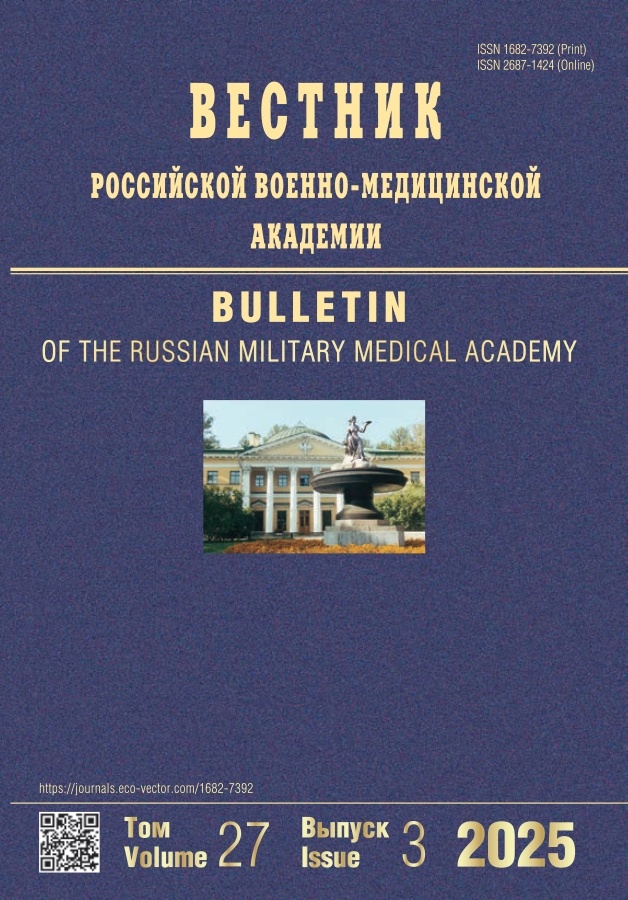Acupuncture correction of homeostasis in boundary mental conditions of the military personnel and penal system officers in extreme conditions
- Authors: Serov VI1
-
Affiliations:
- Академия права и управления Федеральной службы исполнения наказаний России
- Issue: Vol 20, No 3 (2018)
- Pages: 100-104
- Section: Articles
- URL: https://journals.rcsi.science/1682-7392/article/view/12264
- DOI: https://doi.org/10.17816/brmma12264
- ID: 12264
Cite item
Full Text
Abstract
Full Text
##article.viewOnOriginalSite##About the authors
V I Serov
Академия права и управления Федеральной службы исполнения наказаний России
Email: v.i.serov@mail.ru
Рязань
References
- Анатомо-топографическое расположение корпоральных то- чек акупунктуры и показания к их применению / А.Т. Качан [и др.]. - Воронеж: Изд-во Воронеж. ун-та, 1990. - 144 с.
- Березин, Ф.Б. Методика многостороннего исследования личности (структура, основы интерпретации, некоторые области применения) / Ф.Б. Березин, М.П. Мирошников, Е.Д. Соколова. - М.: Фолиум, 1994. - 175 с.
- Булатецкий, С.В. Основные детерминанты суицидального поведения осужденных // Мат. Междунар. науч.-практ. конф. «Научное обеспечение психолого-педагогической и социальной работы в УИС» (к 25-летию со дня образования психологического факультета академии ФСИН России) / С.В. Булатецкий. - Рязань, 2016. - С. 100-110.
- Научно-методические рекомендации по применению стан- дартизированного личностного опросника для медико- психологического обследования кандидатов в вузы / В.М. Воробьев [и др.]. - СПб.: Изд-во Минобороны СССР, 1984. - 32 с.
- Нельсон, Д. Основы биохимии Ленинджера. Т. 2: Биоэнерге- тика и метаболизм / Д. Нельсон, М. Кокс; пер. с англ. - М.: БИНОМ. Лаборатория знаний, 2014. - 636 с.
- Рукавишников, А.А. Пособие по применению MMPI / А.А. Рука- вишников, Н.Г. Рукавишникова, М.Б. Соколова. - Ярославль: НПЦ «Психодиагностика», 2001. - 116 с.
- Сапогова Е. Е. Экзистенциальная психология взрослости. - М.: Смысл, 2013. - 767 с.
- Серов, В.И. Основы психологической коррекции в ИТУ: учеб.- метод. пособие в 2 ч. / В.И. Серов, А.И. Ушатиков, А.С. Новоселова. - Рязань, 1996. - Ч. 1. - 196 с. ; ч. 2. - 162 с.
- Серов, В.И. Психология потери. Защитные адаптивные реак- ции, реакция восстановления после коррекции личности курсантов 5-го курса, выпускников Академии ФСИН России / В.И. Серов // Уголовно-исполнительное право. - 2015. - № 2. - С. 92-98.
- Серов, В.И. Психология потери. Генезис психогенных по- терь у военнослужащих в условиях боевых межэтнических конфликтов / В.И. Серов // Прикладная юрид. психология. - 2015. - № 2. - C. 40-49.
- Собчик, Л.Н. Изучение корреляционных связей между по- казателями peфлексо- и психодиагностики / Л.Н. Собчик [и др.] // II Всесоюзная конференция «Физиология экстре- мальных состояний и индивидуальная защита человека». - М.: Ин-т биофизики МЗ СССР, 1986. - С. 100-110.
- Шапкин В.И. Рефлексотерапия в комплексном лечении за- болеваний и травм нервной системы / В.И. Шапкин, С.С. Бусаков, М.М. Одинак. - Ташкент: Медицина, 1987. - 287 с.
- Шапкин, В.И. Рефлексотерапия: практическое руководство для врачей / В.И. Шапкин. - 2-е изд., стер. - М.: ГЭОТАР- Медиа, 2015. - 640 с.
- Юнкеров, В.И. Математико-статистическая обработка данных медицинских исследований / В.И. Юнкеров, С.Г. Григорьев. - СПб.: ВМА, 2002. - 266 с.
- Acupuncture modulates the limbic system and subcortical gray structures of the human brain: evidence from fMRI studies in normal subjects / K.K. Hui et al. - Hum. Brain. Mapp. 2000. - № 9. - Р. 13-25.
- Nakatani, Y. // J. Autonomic Nerve. - 1956. - Vol. 6. - P. 52.
- Nakatani, Y. Riodoraku Akupunkture / Y. Nakatani, К. Yamashuta. - Tokyo, 1977. - 53 p.
Supplementary files







